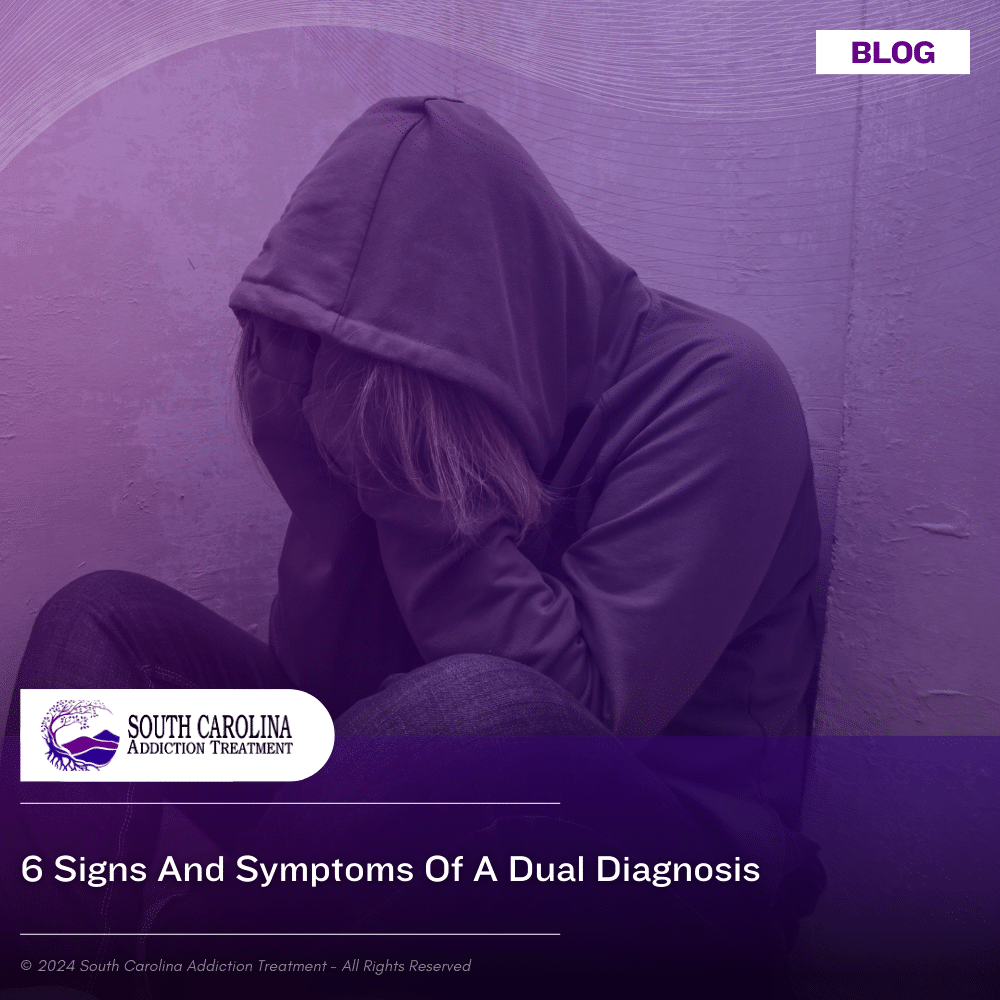6 Signs and Symptoms of a Dual Diagnosis

Medically Verified: 2/1/24
Medical Reviewer
Chief Editor

All of the information on this page has been reviewed and verified by a certified addiction professional.
People who have a mental health condition and an addiction have co-occurring disorders. Having a co-occurring disorder can make recovery a bit more complicated. Thankfully, dual-diagnosis rehab centers combine mental health and addiction treatment to make healing possible.
According to the Substance Abuse and Mental Health Services Administration (SAMHSA), 9.2 million adults have a co-occurring disorder in the United States.[1]
Typically, co-occurring disorders cause you to experience sudden changes in mood and behavior. You might also experience an inability to control your substance abuse and think you need drugs to function correctly.
If you began abusing drugs or alcohol to cope with difficult emotions, you might have a dual diagnosis. Here are six common signs of a dual diagnosis.
1. Feeling Like You Need a Drug to Function
Having a dual diagnosis means you have a substance use disorder. Addiction causes you to think you need drugs or alcohol to function properly. For example, you might need to consume alcohol to feel comfortable socializing with others.
Dependency causes the brain to think that it needs a substance to operate. You probably have an addiction if you feel that drugs and alcohol make you better in general.
2. Withdrawal From Friends and Family
Both mental health issues and addiction can lead to social isolation. When it comes to addiction, you are continuously abusing a substance. You might start hanging out with your friends and family less so that they do not notice you are high.
On the other hand, the symptoms of your mental illness can cause you to withdraw from friends and family. For example, social anxiety makes it hard to be around others without feeling nervous. You might stop interacting with your loved ones to avoid experiencing anxiety or panic attacks.
3. Losing Control Over Your Use of Substances
You might start off using a couple of hits of a drug or only drinking a few glasses of alcohol. As you begin to develop an addiction, the amount of the substance you use tends to increase. You might begin to abuse more drugs or alcohol than you intended to when you started.
You are likely suffering from an addiction if you cannot control how much of the substance you use. An example would include going out and only intending to drink a few beers. However, at the end of the night, you end up blacked out from drinking in excess.
4. Sudden Changes in Behavior
Sudden changes in behavior can occur due to mental health problems or addiction. Your behavioral changes might be prominent when you struggle with a dual diagnosis.
For example, mental health conditions like bipolar disorder cause people to experience episodes of mania and depression. One week, you might feel energized, excited for the future, and ready to take on the world. With bipolar disorder, this can quickly change to feeling low, having little energy, and being extremely sad.
Addiction can cause changes in behavior because of substance misuse. When you are high on the substance you are addicted to, you might feel good. Once you are not able to abuse the drug, you could begin feeling lost, experience symptoms of withdrawal, or even become combative.
5. Developing Tolerance and Withdrawal
When you have co-occurring disorders, that means you are addicted to drugs or alcohol. Part of addiction is developing a tolerance to a specific substance. For example, tolerance occurs when you need a higher dose to experience the desired effect.
Additionally, addiction causes you to experience withdrawal symptoms when you are not using the substance. You might notice symptoms like muscle aches, anxiety, cravings for the drug, and even vomiting. Some substances can lead to severe symptoms like seizures.
You should always seek help from a medical detox program because withdrawal can be life-threatening. Medical detox centers will provide medications to lessen your symptoms and help you stay stable.
6. Engaging in Risky Behaviors
Both parts of your dual diagnosis can lead to risky behaviors. First, addiction often leads people to get themselves into dangerous situations. For example, you might have to interact with drug dealers to obtain the substance you are addicted to.
On the other hand, mental health conditions can increase your likelihood of risk-taking. For example, bipolar disorder causes impulsivity during manic episodes. You might go on shopping sprees you can’t afford or engage in unsafe sex.
You might have a dual diagnosis if you find yourself drinking while driving or getting into dangerous situations frequently.
Get Connected to a Dual Diagnosis Rehab Center
When you have co-occurring disorders, you must treat them at the same time. Leaving one condition untreated can lead to a relapse.
Dual-diagnosis treatment centers offer services for both mental health and addiction. In other words, they provide the support you need to recover from co-occurring disorders.
At South Carolina Addiction Treatment Center, we offer compassionate and evidence-based behavioral therapies for co-occurring disorders. Contact us today for more information on the signs and symptoms of a dual diagnosis. We can help you determine what treatment option is best for you and provide an individualized treatment plan.
References:
- The Substance Abuse and Mental Health Services Administration (SAMHSA): Co-Occurring Disorders and Other Health Conditions, Retrieved January 2024 From https://www.samhsa.gov/medications-substance-use-disorders/medications-counseling-related-conditions/co-occurring-disorders

